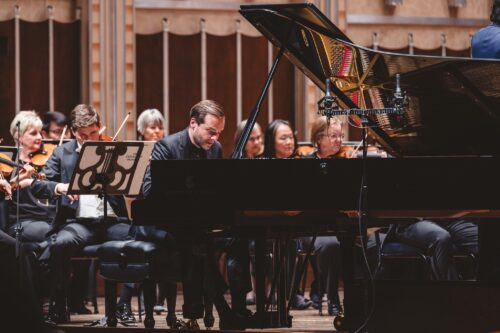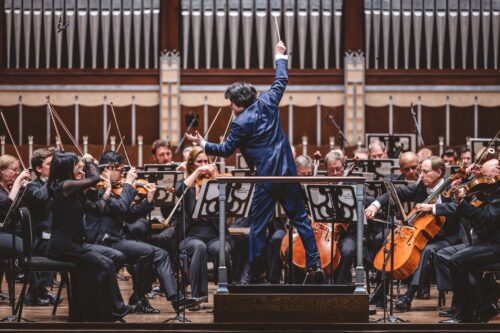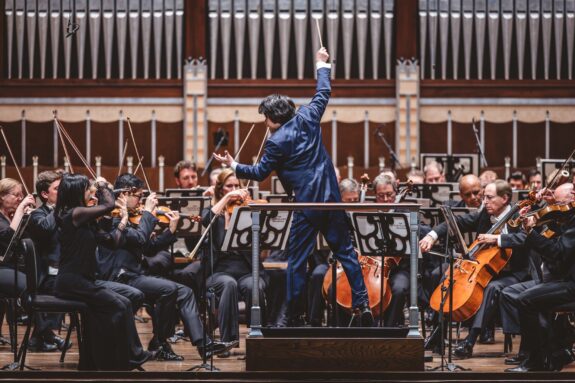 United States Mozart, Elgar: Francesco Piemontesi (piano), Cleveland Orchestra / Kazuki Yamada (conductor). Mandel Concert Hall at Severance Music Center, Cleveland, 24.4.2025. (MSJ)
United States Mozart, Elgar: Francesco Piemontesi (piano), Cleveland Orchestra / Kazuki Yamada (conductor). Mandel Concert Hall at Severance Music Center, Cleveland, 24.4.2025. (MSJ)

Mozart – Piano Concerto No.25 in C major, K.503
Elgar – Symphony No.1 in A-flat major, Op.55
Stylish elegance abounded in the debut of guest conductor Kazuki Yamada with the Cleveland Orchestra. In a distinctive move, he opted for a rarely-heard (in Cleveland, at least) English classic, Sir Edward Elgar’s First Symphony. The piece is a beast, sounding longer than its fifty minutes of running time. The first movement, in particular, covers an epic amount of ground. Yamada proved an elegant, sure-handed guide, skilled at sorting Elgar’s string-drenched orchestration to highlight colors while keeping the entire sound shapely. I would not have minded a touch more urgency to weld the movement together, but Yamada was masterful in his unhurried, unflappable way.
Yamada savored the swirl of mischief, ominous threat and bemusing charm spinning throughout the scherzo second movement, encouraging the players to use full tone and color. The third movement Adagio was the height of the performance, never stagnating but allowing time for vulnerable moments to bloom. It was dreadfully unfortunate that during the tender fadeout, someone (presumably in security) just had to radio a staff member somewhere in the lobby or near the back of the house who had forgotten to turn down a walkie-talkie, crackling harsh noise across the lovely ending. Was something really so important that it couldn’t wait for the performance to unfold? Perhaps ICE agents were threatening to invade the building to deport Elgar for his string-drenched orchestration? Even worse, the radio noise happened again a few moments later, well after Yamada had patiently held the silence for an extra pause between movements before starting the finale. Even if there was an emergency, it could have been handled more discreetly. Back in the days when the tyrant George Szell ruled in Cleveland, such goings-on by the staff would have been met with sackings. I am not saying that should be the modern response but, goodness, it showed a startling disrespect to the performers and audience members.

Regardless, Yamada quickly drew everyone’s focus back into the Brahmsian battle that erupts in the finale, alternating turbulent struggles with striding bravado. By the time the first movement’s noble introductory theme fought its way to the top to emerge in a full blaze of glory, the massive energy of the piece was unstoppable. Yamada drove it home with a thrilling dash to the end, bringing the audience to its feet. Yamada asked the orchestra to stand section by section for bows – a fitting move for a piece that is a workout, a veritable symphonic concerto for orchestra.
The Japanese conductor, who is currently music director of the City of Birmingham Symphony Orchestra and artistic and music director of the Orchestre Philharmonique de Monte-Carlo, supported Italian pianist Francesco Piemontesi with equal elegance and attention in Wolfgang Amadeus Mozart’s Twenty-Fifth Piano Concerto. One of the most aggressively brilliant of Mozart’s solo keyboard concerti, the piece can sound relentless if not tempered with poise. Piemontesi was a welcome guide because of his remarkable ability to capture the fleeting shadows of late Mozart, which he demonstrated a decade ago when he played the Twenty-Seventh Concerto with the Clevelanders during the Blossom Music Festival.
Many pianists can play with brilliance, but Piemontesi has an ability to shape bright scales and roulades in such a way that he captures Mozart’s fleeting shadows. How he manages to do this without losing the shape and flow of such passages is a miracle, but it demonstrates how hypersensitive he is to the shifting moods of music. Piemontesi particularly savors points of transition, whether it be in or out of the quasi-militaristic fanfares of the first movement, or the breathtaking pauses of the Andante. That movement was arguably closer to an adagio than a flowing andante, but it is hard to argue with the spell cast by such music-making, and the finale proved delightfully poised. The audience response was strong and provoked an encore: the slow movement from Mozart’s Piano Sonata No.12, given with an almost Chopinesque bittersweetness.
Mark Sebastian Jordan
